What happened to MapQuest, a free online mapping service based in the United States?
One of the first commercial web mapping services, MapQuest was established in 1996 and it used satellite photos and maps to give users accurate location data.
Individuals could use MapQuest to search for specific places, compare various amenities such as restaurants and petrol stations, and easily plan out their itineraries.
Drivers benefitted from real-time traffic updates, such as traffic camera feeds, and could stay true to local speed regulations.
MapQuest even collaborated with Yelp to provide its users with thorough descriptions and reviews of various areas.
Furthermore, customers use it to compare and book hotels, rental cars, flights, and numerous activities through its connection with Priceline. MapQuest’s Travel platform provided its users with interesting travel-related material.
In addition to its consumer platform, MapQuest provided an enterprise solution that allowed organizations to utilize its location data for their own platforms by utilizing its API.
All these features and functionalities combined enabled MapQuest to become one of the top innovation leaders.
However, while it was once the industry leader in online maps, it failed because its offering was soon rendered inadequate compared to its rival mapping alternatives.
Related Read: Business Innovation: The What, Why, How, and Where
MapQuest’s Demise
We can trace what happened to MapQuest back to Google‘s acquisition of a little-known Australian navigation business called Where 2 Technologies. The acquisition would later serve as the foundation for Google Maps, launched in 2005.
Google Maps is based on a set of improved web technologies known as Ajax. The application broadened the concept of a route-finding service with driving directions to include a searchable database of destinations.
Google Maps was not only more interactive than MapQuest, but users could even change locations by dragging their cursor over the map.
Furthermore, Google invested extensively in its map service to continuously expand and develop the service. This was in stark contrast to AOL, which made small, infrequent investments in MapQuest with no clear future plans.
MapQuest usage dropped even further by 2007 after Google eliminated links to competing mapping sites from its search results. Google Maps surpassed MapQuest as the most popular mapping site two years later.
Furthermore, as smartphones became widely available, portable technology was ideal for individuals who required directions on the go. This became possible after companies began deploying GPS technology on smartphones in 2004.
GPS, previously restricted to government and military usage, provided civilians with a wealth of positional data. MapQuest, with its static list of driving directions, quickly fell behind.
MapQuest users had to download the program individually, whereas Google Maps and, eventually, Apple Maps were factory-installed on their handsets.
Finally, MapQuest lacked the networking capability of more effective services such as Google, which had invested significant resources in improving Google Maps and did not need to monetize it immediately.
In conclusion, MapQuest failed to keep up with its competitors’ pace of innovation and greater product offerings. It did not adjust its business model to shifting market trends, ultimately contributing to its demise.
According to Heather Dougherty of Hitwise, Google Maps had more hits than MapQuest. “The average visit time on MapQuest remained higher at 10 minutes and 51 seconds as compared to 7 minutes and 24 seconds on Google Maps.”
Verizon paid $4.4 billion to acquire AOL in May 2015. Rumors began circulating that Verizon aimed to downsize AOL by selling some of its businesses.
The California-based ad-tech business System1 acquired MapQuest in October 2019 for an undisclosed sum. The transaction price was so low that Verizon did not even disclose it.



